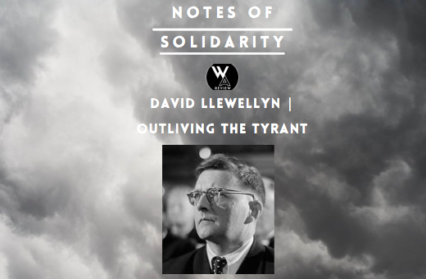Notes of Solidarity is a new daily series of mini-essays, poems, and reflections on the Russian war on Ukraine by some of Wales’s leading literary figures. Here, Welsh novelist and script writer David Llewellyn reflects on the work of Dmitri Shostakovich, the Soviet-Russian composer who outlived Stalin.
The applause lasted half an hour, almost as long as the symphony itself. There were a few scowling faces, those who refused to believe Comrade Dmitry had seen the error of his ways, but by most accounts Shostakovich’s fifth symphony was a triumph. At the time of its premiere, in November 1937, Stalin’s great purge was in its fourth year, countless men and women having been subjected to exile, show trials and much worse.
By 1936 Stalin’s paranoia went beyond the limits of party and politburo, setting its sights on “formalism” in literature and music, works that ran counter to the ethos of socialist realism. One such piece was Shostakovich’s opera Lady Macbeth of Mtsensk, based on the novel by Leskov. This dark melodrama was described as “muddle instead of music” by one critic, rumoured to have been none other than Stalin.
Shostakovich lived in fear through much of the following year, keeping a suitcase and winter coat by the door, in case the secret police came knocking. A newspaper article, apparently written by the composer, described the fifth symphony as “a Soviet artist’s response to just criticism”. Whether he actually wrote it remains uncertain. What many in the audience remembered was not the stirring bombast of its opening and closing movements but the haunting melancholy of its third, the largo, during which many of them wept. It was a moment of catharsis.
Joseph Stalin died on March 5th 1953, outliving many of the artists he persecuted. Dmitry Shostakovich went on to write another ten symphonies, and would later describe those years as “unbelievably mean and hard”. His fifth symphony is now widely recognised as a commentary on a time of terror, and Lady Macbeth of Mtsensk is performed regularly on stages around the world.
Stalin’s successor, Nikita Khrushchev, began a process of de-Stalinisation, the city of Stalingrad reverting to its original name, Volgograd, in 1961.
For more information on the Russia-Ukraine war, including ways you can help, please click here.
You can follow all contributions to Notes of Solidarity from Wales Arts Review here.











